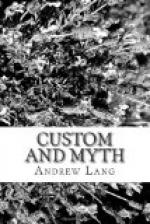But another cult, an alien creed, is approaching Kalevala. There is no part of the epic more strange than the closing canto, which tells in the wildest language, and through the most exaggerated forms of savage imagination, the tale of the introduction of Christianity. Marjatta was a maiden, ’as pure as the dew is, as holy as stars are that live without stain.’ As she fed her flocks, and listened to the singing of the golden cuckoo, a berry fell into her bosom. After many days she bore a child, and the people despised and rejected her, and she was thrust forth, and her babe was born in a stable, and cradled in the manger. Who should baptize the babe? The god of the wilderness refused, and Wainamoinen would have had the young child slain. Then the infant rebuked the ancient Demigod, who fled in anger to the sea, and with his magic song he built a magic barque, and he sat therein, and took the helm in his hand. The tide bore him out to sea, and he lifted his voice and sang: ’Times go by, and suns shall rise and set, and then shall men have need of me, and shall look for the promise of my coming that I may make a new sampo, and a new harp, and bring back sunlight and moonshine, and the joy that is banished from the world.’ Then he crossed the waters, and gained the limits of the sea, and the lower spaces of the sky.
Here the strange poem ends at its strangest moment, with the cry, which must have been uttered so often, but is heard here alone, of a people reluctantly deserting the gods that it has fashioned in its own likeness, for a faith that has not sprung from its needs or fears. Yet it cherishes the hope that this tyranny shall pass over: ’they are gods, and behold they shall die, and the waves be upon them at last.’
As the ‘Kalevala,’ and as all relics of folklore, all Marchen and ballads prove, the lower mythology—the elemental beliefs of the people—do survive beneath a thin covering of Christian conformity. There are, in fact, in religion, as in society, two worlds, of which the one does not know how the other lives. The class whose literature we inherit, under whose institutions we live, at whose shrines we worship, has changed as outworn raiment its manners, its gods, its laws; has looked before and after, has hoped and forgotten, has advanced from the wilder and grosser to the purest faith. Beneath the progressive class, and beneath the waves of this troublesome world, there exists an order whose primitive form of human life has been far less changeful, a class which has put on a mere semblance of new faiths, while half-consciously retaining the remains of immemorial cults.
Obviously, as M. Fauriel has pointed out in the case of the modern Greeks, the life of such folk contains no element of progress, admits no break in continuity. Conquering armies pass and leave them still reaping the harvest of field and river; religions appear, and they are baptized by thousands, but the lower beliefs and dreads that the progressive class has outgrown remain unchanged.




